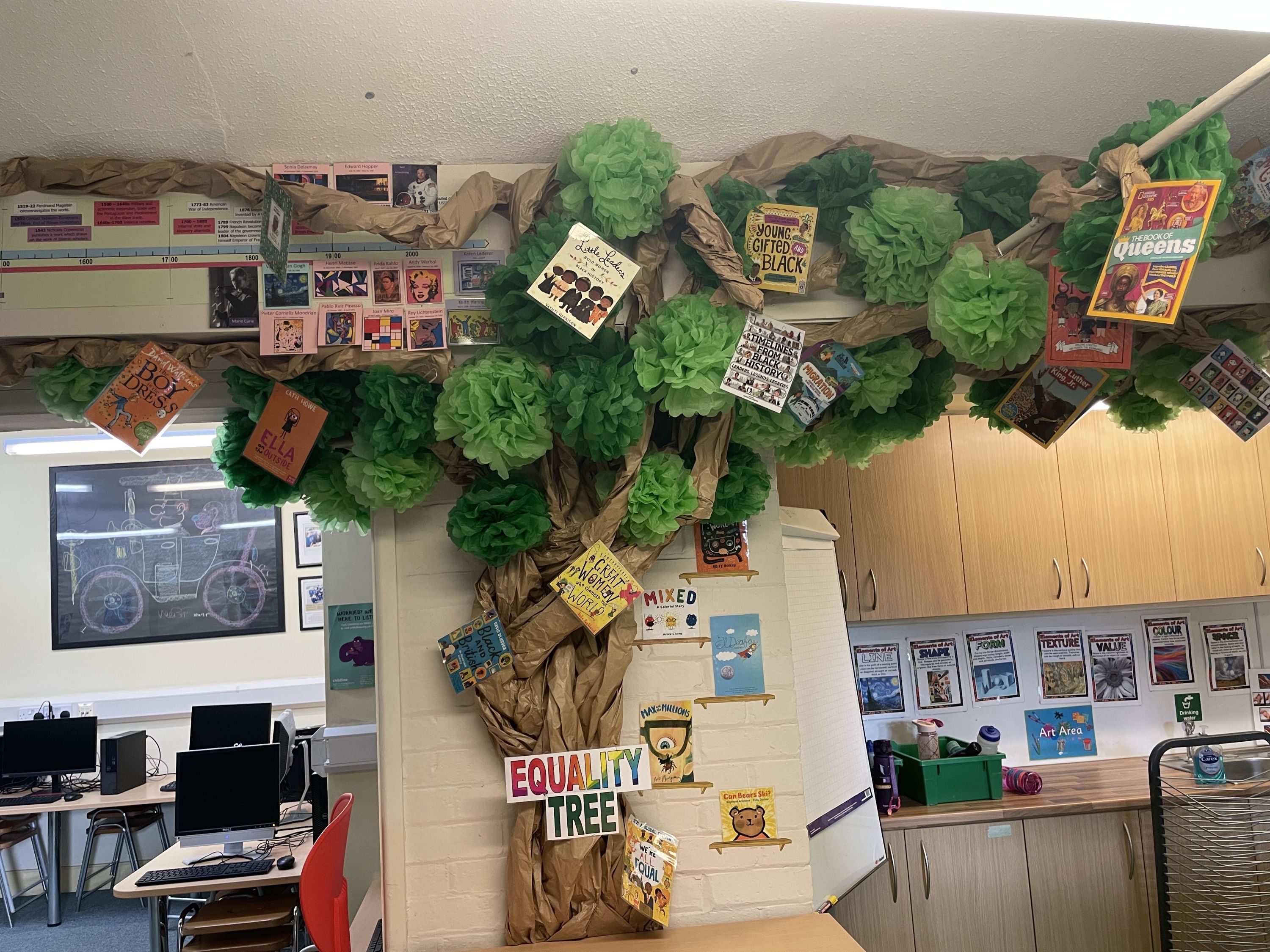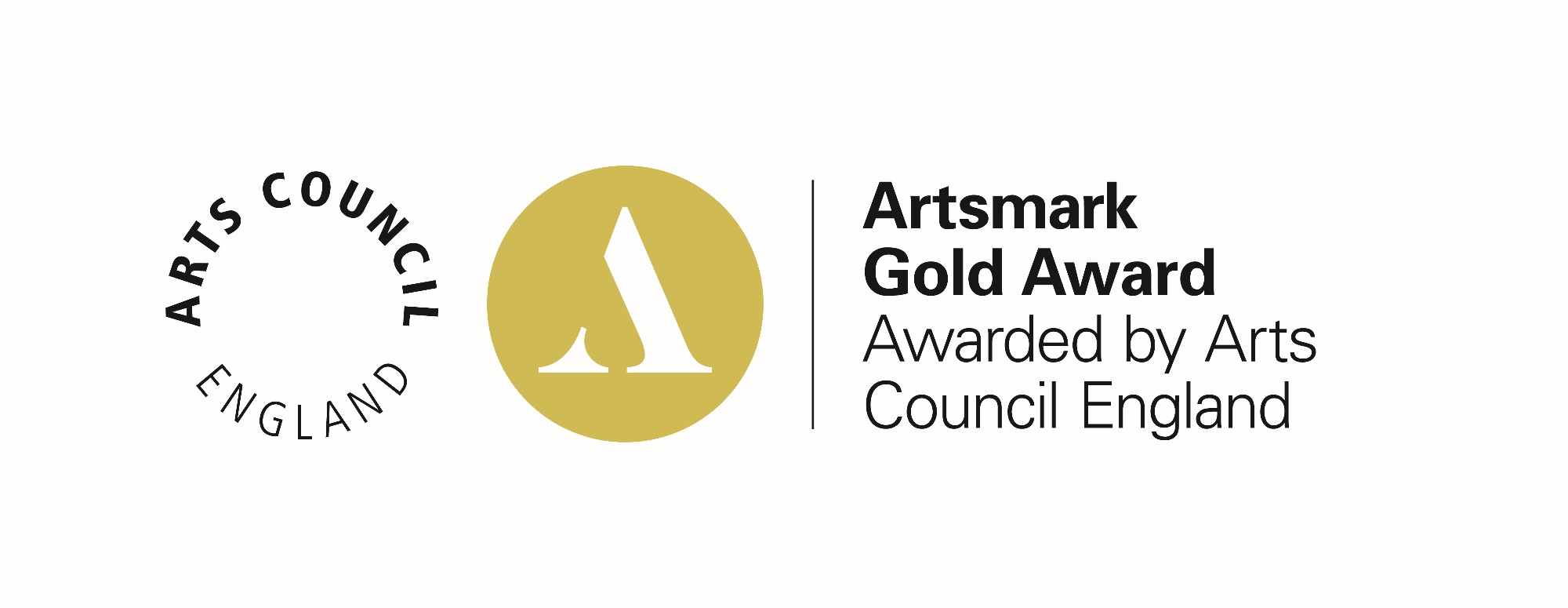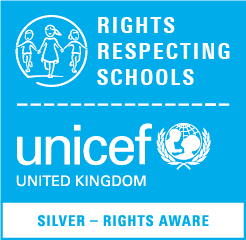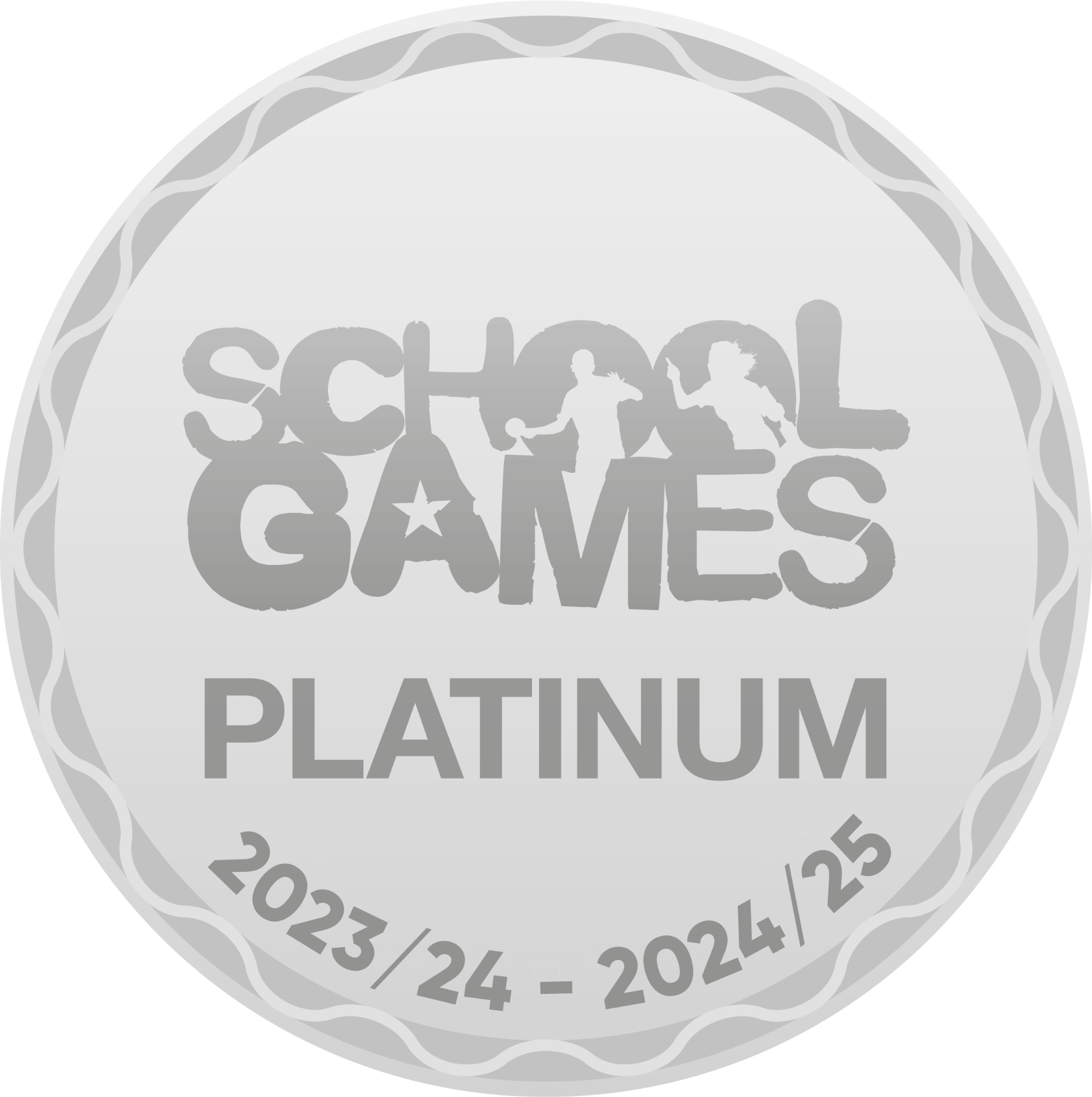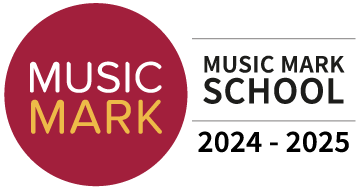Inclusion and Equality Information
For information on Hampshire's services for young people with special educational needs and disability, advice and support service, please click below:
We hope you will find all the information you are looking for on our site, including our Inclusion Policy which can be found here and our SEND information report, attached at the bottom of this page. However, please do not hesitate to contact the office should you have any further questions.
Public Sector Equality Duty
What is the Public Sector Equality Duty?
The single Public Sector Equality Duty (PSED) came into effect in April 2011 as a result of the Equality Act. It requires public bodies to promote equality and replaced three pre-existing duties relating to disability, race and gender equality.
The PSED applies to all maintained and independent schools, including academies, and maintained and non-maintained special schools.
Protected Characteristics
The Department for Education (DfE) has published non-statutory advice that sets out schools' obligations under the PSED.
Paragraph 5.1 explains that the PSED extends to the following protected characteristics:
- Race, disability, sex, age, religion or belief, sexual orientation, pregnancy and maternity, gender reassignment
Paragraph 5.1 of the document explains that the PSED has three main elements. In carrying out their functions, public bodies are required to have due regard to the need to:
- Eliminate discrimination and other conduct that is prohibited by the Equality Act 2010
- Advance equality of opportunity between people who share a protected characteristic and people who do not share it
- Foster good relations across all characteristics, and between people who share a protected characteristic and people who do not share it
Due Regard
Paragraph 5.4 of the DfE's advice says that 'due regard' has been defined in case law and means giving "relevant and proportionate consideration to the duty".
For schools, this means:
- Decision makers must be aware of the duty to have due regard when making a decision or taking an action, and must assess whether it may have implications for people with particular protected characteristics
- Schools should consider equality implications before and at the time that they develop policy and take decisions, not as an afterthought, and they need to keep them under review on a continuing basis
- The PSED has to be integrated into the carrying out of the school’s functions, and the analysis necessary to comply with the duty has to be carried out seriously, rigorously and with an open mind
What does our school do to eliminate discrimination ?
We have set a clear vision and values which expect all our staff to act in a non-discriminating manner and be mindful to avoid actions that will be deemed as such to the public and our wider community.
We have up-to-date and ratified policies which set out a clear message that discrimination is not tolerated. This includes the staff code of conduct, rights respecting behaviour, anti-bullying, safeguarding and child protection policies.
We understand that it is unlawful to fail to make reasonable adjustments to overcome barriers to using services caused by disability.
The governing body and school leaders involved in recruitment will avoid unlawful discrimination in all aspects of employment including recruitment, promotion, opportunities for training, pay and benefits, discipline and selection for redundancy.
Through a structured PSHE curriculum offer (including SCARF curriculum), assemblies, workshops and visits, equalities are discussed with and taught to the children, exemplifying the British Values and school values that we believe in. Planning across all areas of the curriculum uses resources and case-studies which reflect diversity and challenge stereotypes.
School display space is used to promote awareness of protected characteristics and our EARA (Equality and Rights Advocates) group work with other local schools to promote and develop an inclusive ethos for the school; this is shared through their position on School Parliament and initiatives such as leading assemblies.
Our Rights Respecting ethos recognises (Article 2 and 23 in particular) that all children have rights set out in the UNCRC, and individual children and young people shouldn’t be discriminated against when these rights are realised.
Hampshire Inclusion and Diversity Partnership
Langrish are delighted to share that we have formally joined the Hampshire Inclusion and Diversity Partnership by signing the partnership’s commitment document (see bottom of page). This is a significant and exciting step in our ongoing journey to ensure that our school is a place where everyone feels they truly belong.
At the heart of this commitment is the belief that every child, every family, and every member of our school community should feel seen, heard, and valued. We want Langrish to be a place where all children can thrive, where their identities are celebrated, and where they are equipped with the skills and confidence to challenge injustice and contribute positively to society.
By joining the partnership, we are committing to:
- Creating an inclusive school culture and curriculum where every voice is heard and respected;
- Promoting critical thinking and challenging prejudice, discrimination, and racism;
- Developing teaching practices that reflect and celebrate the diversity of our community;
- Providing positive role models from all walks of life;
- Ensuring that all children are empowered to aspire, achieve, and make a difference;
- Working in close partnership with parents, carers, and the wider community to foster a shared sense of belonging and purpose.
We believe that when children feel a strong sense of belonging, they flourish—and that this sense of belonging must extend to their families too. Your voice, your experiences, and your involvement are vital to the life of our school, and we are committed to working with you to build a community where everyone feels welcome and included.
Our Equality and Rights Advocates will continue to play a vital role in our work but our commitment stretches far beyond this. From our People Project to the work you will read about on the next couple of pages of our Nutshell, inclusion and diversity is being woven through every aspect of our curriculum. It is no accident that one of our core values is ‘Belonging’ and we look forward to continuing to evolve to ensure that everyone’s voice is heard, need are met and experiences valued.
Promoting diversity through the protected characteristics

We have adopted these symbols, from Picture News, to use across the school whenever one of the characteristics is referenced. Our EARA group have been busy creating a new display space, where these are more prominently displayed alongside books which feature characters representing them. In our Infant classrooms, these stories are shared under the umbrella term of 'celebrating difference'; this becomes more refined in the Junior classes where individual characteristics are referenced. Each class has a set text per half term to share as part of their PHSE provision. These are carefully mapped to link with their learning and experiences so all protected characteristics are understood within a context by the end of Year 6.
EARA Spring network meeting, February 2026
Termly, EARA groups from across East Hants meet up to continue to develop their knowledge and understanding of equality, equity and rights. This term, the focus was salad bowls! The children had to imagine that our school was a salad bowl and consider what would be in the salad. Our EARA group decided that the protected characteristics were the ingredients. They then designed a salad dressing (our values) and a menu which contained all of our differences, from physical (hair colour, eye colour, shape and so on) to every individual's unique personalities, thinking about likes, dislikes, interests and so on. Furthermore, they presented a recent learning walk and pupil voice they had completed.
Houses of Parliament trip, January 2026
In January, we took twenty members of our School Parliament to the Houses of Parliament to learn about democracy. We had a workshop at the beginning, where we learnt about the history of Parliament. This led onto a guided tour, where we learnt about what MPs do each day, the history of the building and the difference between the House of Lords and the House of Commons. We even got to sit in on a debate in the House of Lords, a unique experience most do not get to attend. Finally, we stood in the House of Commons. It was a great day in which our pupils shone and many have claimed it to be the best trip ever!
Damien Hinds - MP visit, December 2025
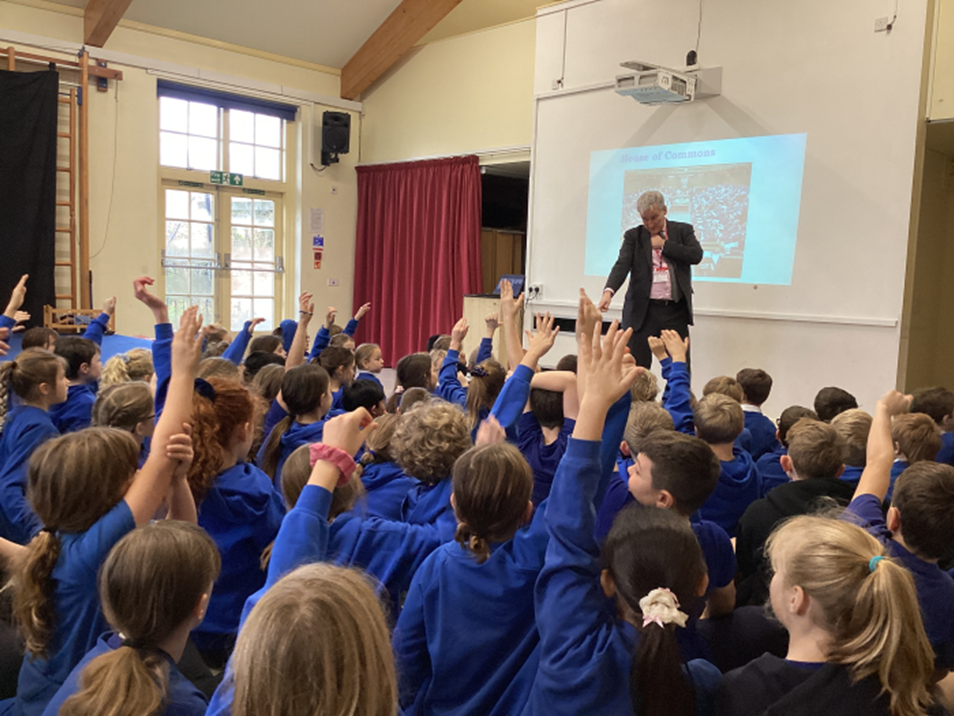

This month, we had our East Hants MP visit to deliver two assemblies: one to KS1 and one to KS2. He spoke in great detail about what the Houses of Parliament are, what he does as an MP and some of the history of our government. It was an interactive experience where our pupils got the chance to ask lots of questions. He spoke afterwards of his astonishment at how fantastic our pupils were and that he would love to visit again!
Anti-bullying week, November 2025 -
Power For Good
This year's anti-bullying week theme was 'Power For Good,' trying to encourage us to stand up, be powerful and be allies or upstanders to others. In Year R and KS1, our pupils became superheroes, creating power poses and making superpower badges. In LKS2, our pupils did some roleplay, acting out what you would do if you were in a situation where someone else was bullying you. In UKS2, our pupils created booklets on how to be safe online. It was another productive and powerful anti-bullying week that reminded us of the importance of being kind, standing up for ourselves and others.
Famous neurodivergent people assembly - November 2025
This week, during anti-bullying week, our EARA group put together an assembly on famous people with a neurodivergence. They had to research the person, why they are famous, and a little about their neurodivergence, then we delivered an assembly to the school on these individuals and why they are so inspiring! The reason they are not wearing their school unform is because it was a non-school uniform day for Children In Need! They chose the people themselves, and they were: Maya Angelou, Dr Sharon Zivkovic, Greta Thunberg, Kayla Smith, Stephen Wiltshire, Frida Kahlo, Simone Biles and Alan Turing. Each individual has or had a different neurodivergence from autism to OCD to ADHD and many other neurodivergences.
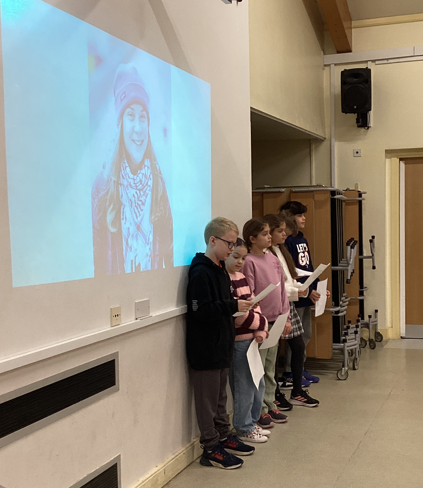
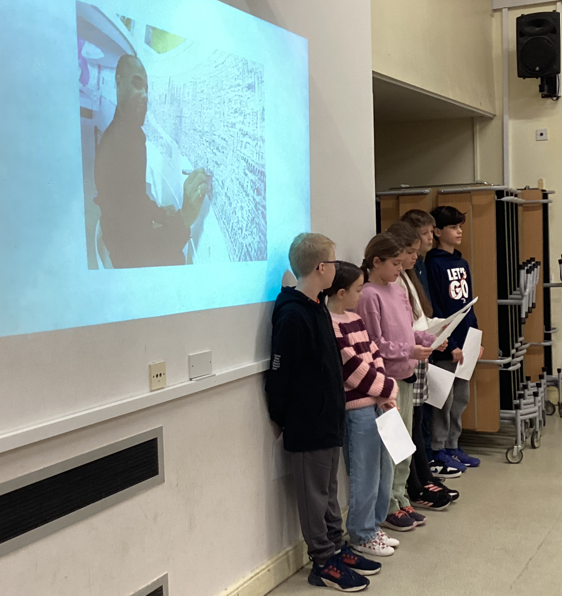
United Nations speaker - October 2025
Black History Month - October 2025
At Langrish, year groups deliver a class assembly to the school and parents/carers each year. This year, Year 4 delivered their class assembly on Black History Month. They had learnt, during their People Project lessons, about Rosa Parks and Martin Luther King JR and the impact they have had on America's civil rights movement during the 1950s and 1960s. It was an inspirational assembly, which taught the school all about black history, the civil rights movement in America, and how both Rosa Parks and Martin Luther King JR had a huge impact on the country for decades to come.
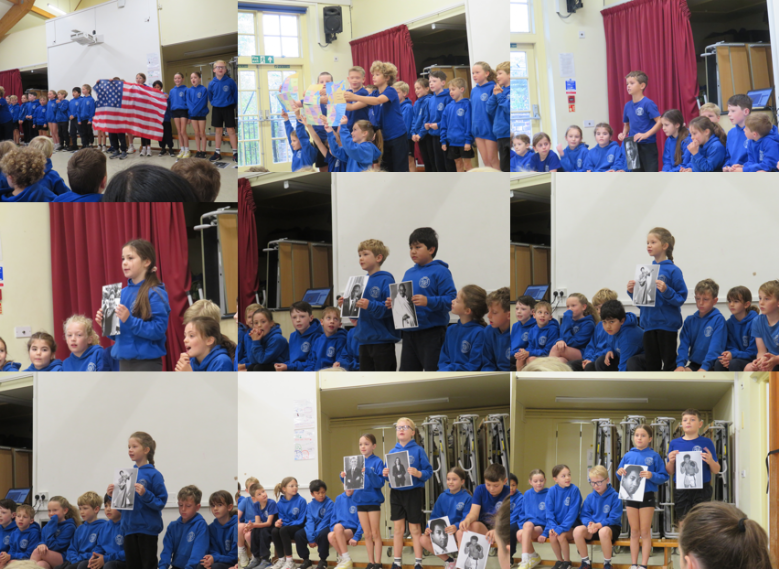
EARA Conference October 2025
Our EARA group travelled to Southampton this half-term to present at the 2025 Hampshire EARA Conference. They spoke to 50 adults from a variety of schools across primary and secondary phases about all of their hard work over the past few years at Langrish. It was an amazing experience for them, speaking pubicly in front of such a large audience of adults; they also enjoyed hearing from other schools and the key note speaker who spoke so passionatley about being any ally, not a bystander.
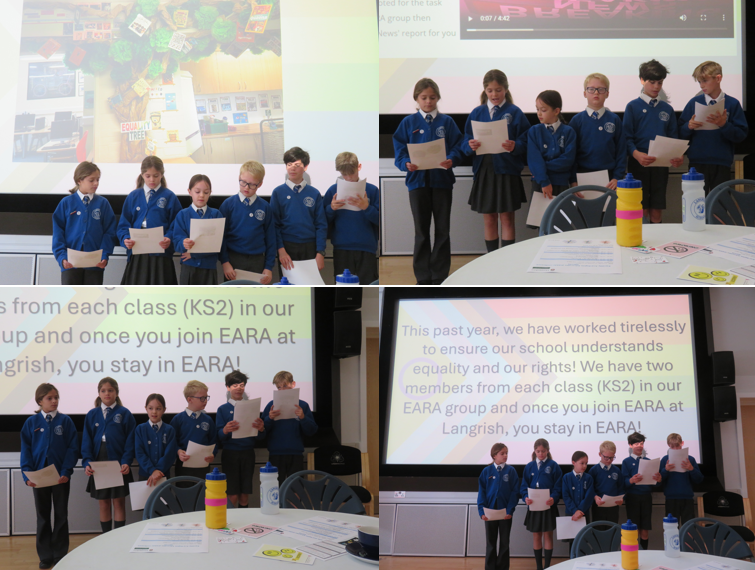
Welcome back assembly, September 2025
To welcome everyone back to school and remind every one of our journey, EARA delivered an assembly. They spoke about the UN Convention of the Rights of the Child, our rights respecting charters, the article of the week (which is introduced weekly in Monday's assembly, followed by a discussion in class) and EARA reminded everyone of all the work completed last year.
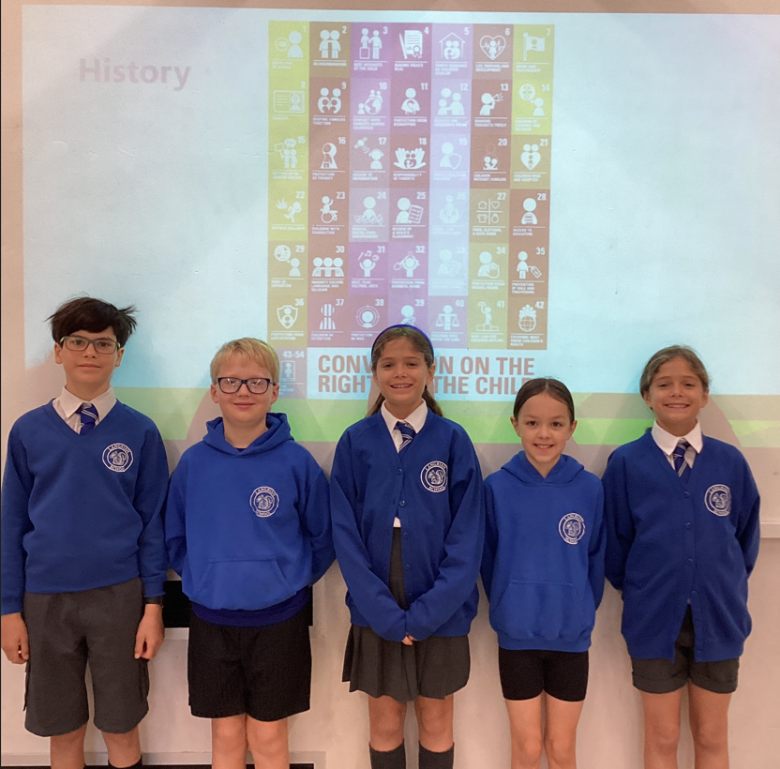
'This Is Me - The Remix' An Equality Project by Year 5 2025
This past academic year, Year 5 spent some music and PHSE lessons learning the remixed version by Missy Elliott and Kesha of 'This Is Me' from The Greatest Showman. They learnt the song, having auditioned for the solos and rap verses, and then produced a music video to showcase their hard work. They also created words, which, when put together, form famous quotes about equality and diversity.
Final News Report - EARA, July 2025
EARA wanted to draw together all the work they had done this year by creating a news report, interviewing pupils from across KS2, asking them how EARA and the People Project have impacted them. Take a look below.
Inspiring Heroes Whole School Assembly - July 2025
Our EARA group wanted to end the year with a final assembly about people who inspire them. They went off and did their research, finding out more about their individuals, then presented their final assembly to the whole school. They wanted to ensure each individual reflected a variety of protected characteristics.
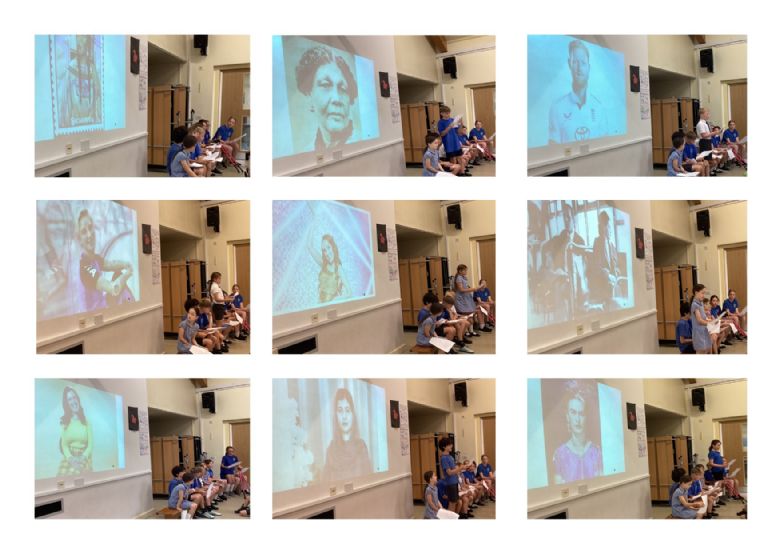
Rockidz Anti-Bullying Workshop, March 2025
Following on from our work in November 2024 (Anti-bullying week), we invited Rockidz in for a head-banging workshop where we learnt that it is ok to be me, celebrating our individualism and mutual respect for others and our differences. We acted like rockstars, learnt the acronym 'YASBA' (you're awesome so be awesome) and the teachers even had to get up and dance!
EARA Network Meeting Spring 2025
This term, our EARA group (Years 5 and 6) attended our termly network meeting with the other EARA schools in East Hampshire. At this meeting, we learnt about kindness and respect towards others, especially those with disabilities or neurodivergence. Our school also presented all of the hard work we have been up to this academic year:

EARA-Kindness Assembly March 2025
After one of our EARA meetings, we decided to put together a kindness assembly, where we gave the school many different phrases, words and sayings they can use to spread kindness across the school. We then gave the school some time to think about other things they can say or do to be kind.
The People Project
Inclusion and diversity remain a hugely important aspect of our children's education; we often ask ourselves how we can broaden our children’s experience of difference when the majority of their interactions are with those of a very similar demographic. Over the past few years, we have developed the content of our reading scheme and library to better reflect diversity; through auditing our curriculum, leaders have ensured those studied are representative of broader society and last year the children thoroughly enjoyed our cultural afternoon, learning from their peers about the range of cultures in their own classes.
As part of our School Development Plan, this year we wanted to launch a new element to our PHSE curriculum, which would allow time to stop and celebrate this cultural richness in its own right. How can we equip our children to talk about others using respectful language and empathy if we do not take the time to model this discretely within a context? We wanted an exciting, whole-school approach: the People Project was born!
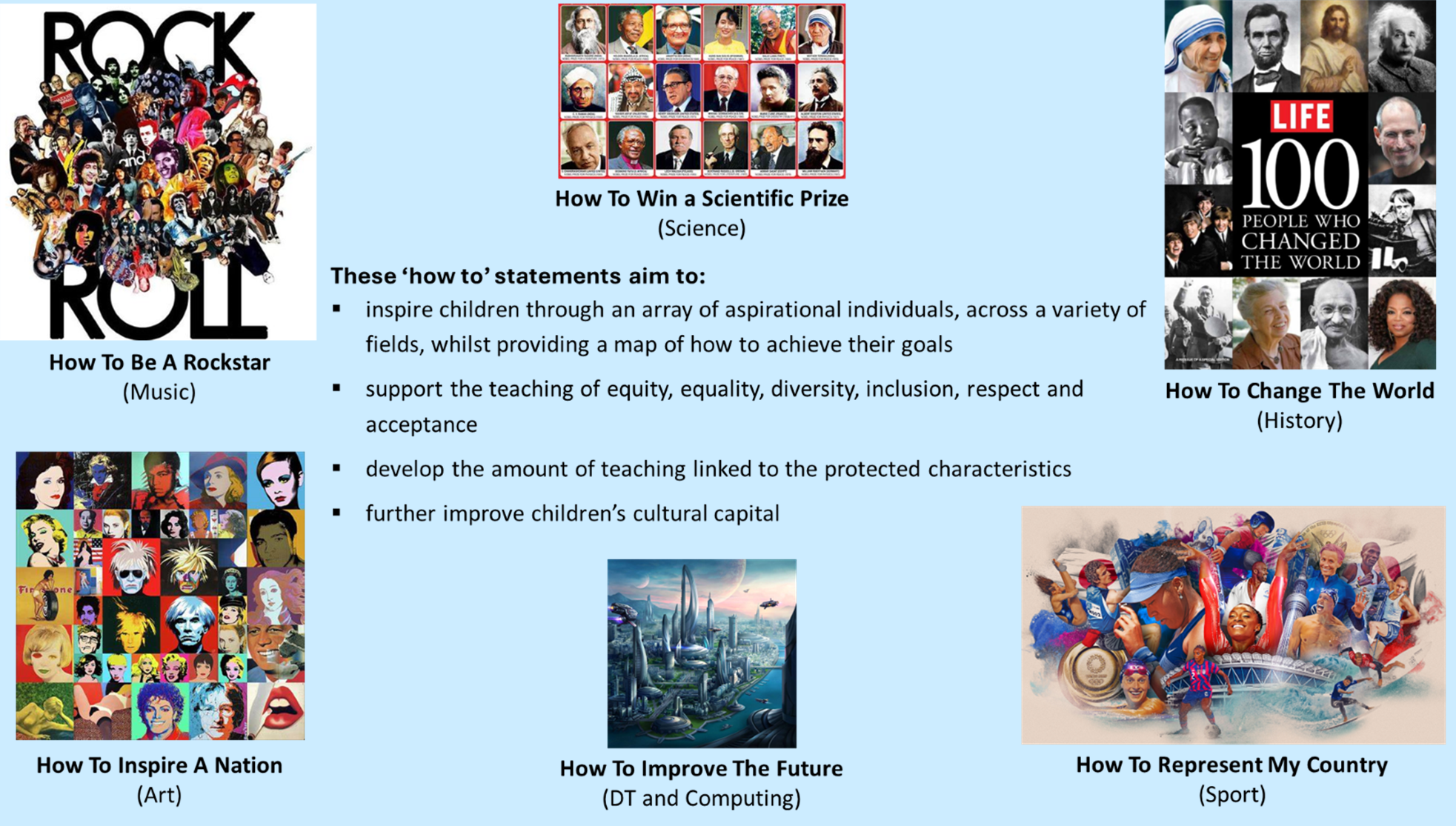
Learning is captured in class books, through displays and videos for ease of sharing with the whole community. We hope that over time, the children will develop a repertoire of strong, inspirational figures who exemplify the differences we learn about, helping to contextualise and embed their understanding.
Quotes from pupils on the impact of the People Project, December 2025
Having finished the People Project in full (this is now embedded in our practice and will continue each half-term), we wanted to complete some pupil voice on its impact. This is captured below:
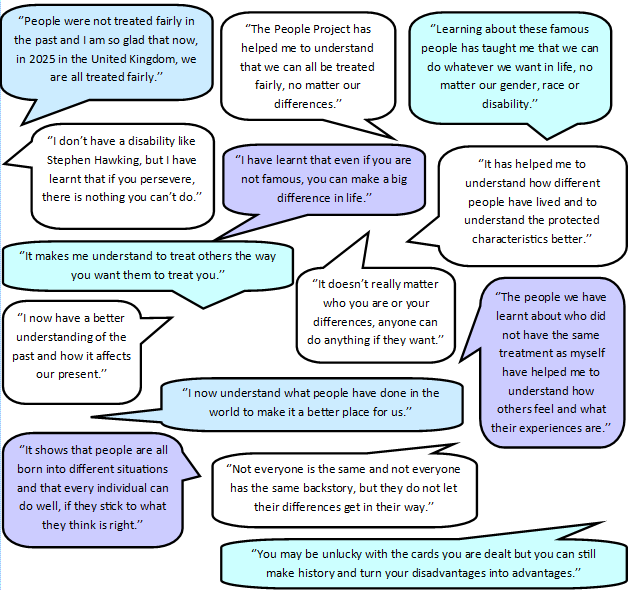
How to inspire a nation, November 2025
The final unit in the People Project has focussed on inspiring artists across a wide range of artistic forms, such as Jean-Michel Basquiat, David Hockney and Yayoi Kusam. Below is a video that captures the art produced alongside information on the artists, narrated by our Arts Ambassadors:
How to change the world, October 2025
This half term, the People Project has been in full swing, finishing off this term with the final two units. How To Change The World has been the focus, learning about famous people in history who had an impact on history, like Martin Luther King Jr, Nelson Mandela, Queen Elizabeth the 2nd and Mary Seacole. The theme for this unit was 'Discrimination' and the outcome was a documentary put together by our EARA group. Here it is...
How to improve the future, July 2025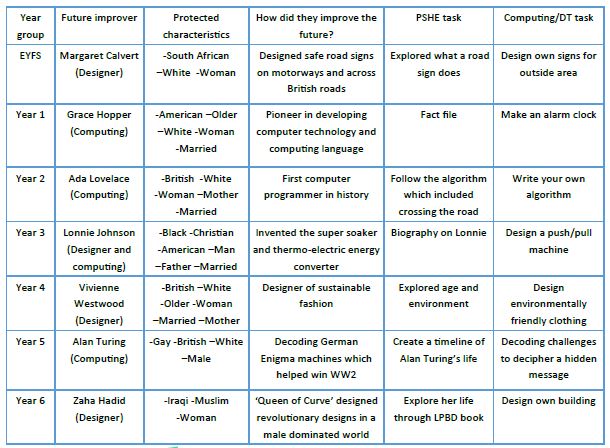
To finish off our school year, we completed one more unit of The People Project entitled 'How To Improve The Future.' During this unit, we looked at famous individuals from the Design & Technology world, as well as the computing world. We learnt about how they improved our present through their designs and inventions, then thought about how we can improve our futures. The theme was 'How We Can Help Others.' Each year group had to produce a TED Talk about how we can improve our future as the outcome. The Ted Talks are below.
How to represent your country, May 2025
During the first half of Summer Term, Langrish built upon the work completed on our 'People Project' by exploring sports people in our 'How to represent your country' unit, this time investigating how our differences define us (intersectionality in KS2). Pupils learnt about their sports person in PSHE, tried the sport out for themselves in Physical Education lessons and our final outcome, for this unit, was split into two. One of the outcomes (for EYFS and KS1) is on the right, 'Langrish's Question Of Sport,' a new quiz show dedicated to sport and famous sports people. Take a look now! The overview for this unit of the People Project is below. In addition, we produced a 'Match Of The Day' style commentary television show, produced and directed by our EARA group, discussing KS2's sports lessons, which is below.
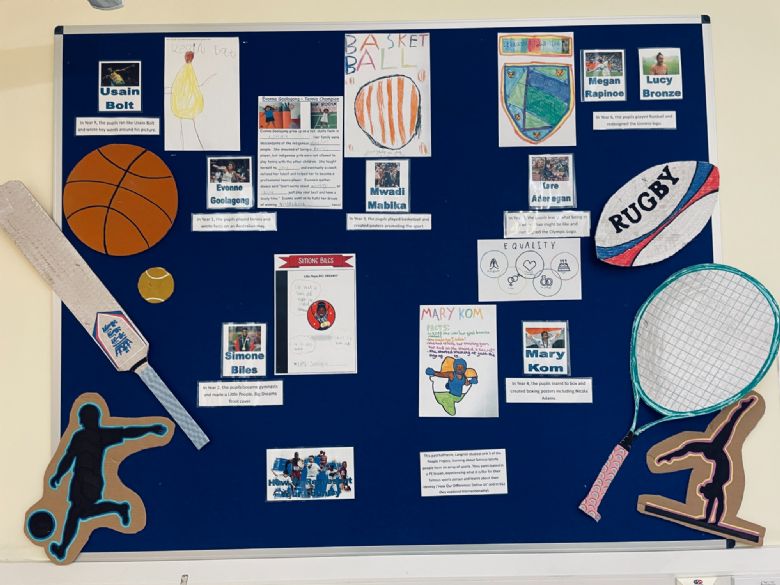
How to win a Scientific Prize, March 2025
In Spring 2, 2025, Langrish continued our 'People Project' by learning about famous scientists from an array of scientific fields who have a variety of protected characteristics. The theme for this unit was stereotypes. Year groups learnt about different scientists and produced work around these scientists, which will go 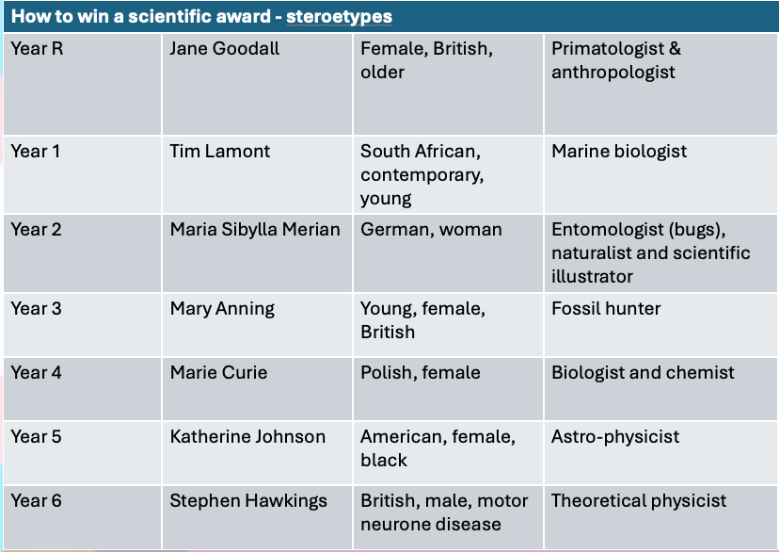 in to their scientist books (red books building up a library of books to take with them through school). Our final outcome was to put together a YouTube series (as suggested and produced by our EARA group). We used a green screen to give the video a YouTube series feel and teachers chose Individuals from each year group to deliver their work. The YouTube series is on the right, as well as the overview for this unit of work.
in to their scientist books (red books building up a library of books to take with them through school). Our final outcome was to put together a YouTube series (as suggested and produced by our EARA group). We used a green screen to give the video a YouTube series feel and teachers chose Individuals from each year group to deliver their work. The YouTube series is on the right, as well as the overview for this unit of work.
Stay tuned for the Summer Term when we will be exploring inspirational sports people! 'How to represent my country' is the unit and our theme will be 'how our differences define us' with a focus on intersectionality in KS2.
How to be a Rockstar, January 2025
In Spring 1, 2025, we began with our music project: How to be a Rockstar. With an overarching theme of celebrating difference, you can see details of what each class’s focus was below. To showcase the wonderful work each class completed, our EARA group produced and directed a music video for the Guns N Roses song 'Sweet Child Of Mine.' This video showcases the work produced within the unit. They wanted the video to be reminiscent of Top Of The Pops!
| Year | Rockstar | Learning Focus |
|---|---|---|
| R | Taylor Swift | Who is she? |
| 1 | Freddie Mercury | How did he use power poses to help him? |
| 2 | Elton John | How does he show his creativity & identity? |
| 3 | Stevie Wonder | What is it like to be a child protege? |
| 4 | The Spice Girls | How can our differences make us stronger? |
| 5 | Florence and the Machine | How diverse should a festival's headliners be? |
| 6 | BTS | How does influence spread? |

Next half-term, our theme of stereotypes will guide the learning for our science project as consider 'How to Win a Scientific Prize.'
Anti-Bullying Week Autumn 2024
This year's Anti-Bullying Week theme was 'Choose Respect'. During the week, our students completed work around celebrating differences and investigating the correct language to use to describe different protected characteristics. This was put together by our EARA group. In KS2, the children voted for the task they wanted to complete. Our EARA group then produced the following 'Langrish News' report for you to share their learning!
Equality Tree October 2024
In our school library, our EARA group produced our new equality tree filled with equality-driven books, covering all the protected characteristics. The tree is designed to promote equality-driven choices when visiting the library.
